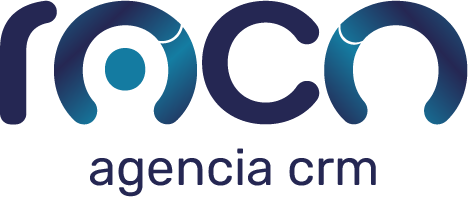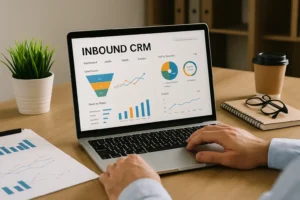En un entorno empresarial cada vez más competitivo, gestionar correctamente las relaciones con los clientes se ha convertido en una prioridad para cualquier organización. Es aquí donde entra en juego el CRM, un sistema diseñado para centralizar, organizar y optimizar las interacciones con clientes actuales y potenciales, mejorando la eficiencia y la personalización del servicio.
En este artículo te explicamos qué es un sistema CRM y por qué es importante para la gestión de clientes. Nos enfocaremos en las funciones básicas del CRM, cuándo es necesario implementarlo, y cómo estas capacidades pueden potenciar la productividad, el servicio y el crecimiento de tu negocio.
¿Qué es un Sistema CRM y por qué es Importante para tu Negocio?
Un sistema CRM, o Customer Relationship Management, es una herramienta que permite gestionar todas las interacciones de una empresa con sus clientes desde un solo lugar. Su propósito es construir relaciones más fuertes, automatizar tareas rutinarias, optimizar procesos comerciales y mejorar la satisfacción del cliente.
Los CRMs modernos no solo organizan información: integran funciones de ventas, marketing, soporte y análisis para ofrecer una visión 360º del cliente. Esto permite crear experiencias personalizadas, aumentar la fidelización y tomar decisiones basadas en datos reales.
Beneficios de Implementar un CRM
Contar con un CRM no se trata solo de adoptar una herramienta tecnológica, sino de integrar una estrategia centrada en el cliente. Cuando se aplican correctamente las funciones básicas del CRM, las empresas pueden optimizar procesos, mejorar la comunicación interna y brindar una experiencia de cliente mucho más efectiva.
Además, al implementar las funciones básicas del modelo relacional CRM, se facilita el acceso a datos organizados y en tiempo real, lo que permite tomar decisiones estratégicas con mayor precisión. Esto se traduce en más ventas, una mayor retención de clientes, menos tareas manuales y mejores resultados comerciales.
Funciones Básicas del CRM
Las funciones básicas del CRM son los pilares que sostienen la eficacia de esta herramienta. Si bien existen muchas funcionalidades avanzadas, estas son las esenciales para empezar a mejorar la relación con tus clientes y optimizar tus procesos:
Gestión centralizada de contactos
Una de las funciones básicas del CRM es permitir la creación de un registro completo y actualizado de cada cliente o prospecto. Incluye datos personales, interacciones previas, historial de compras, preferencias, y más. Esto facilita una comunicación personalizada y una atención al cliente más efectiva.
Seguimiento de oportunidades y automatización de ventas
Permite visualizar en qué etapa del embudo se encuentra cada oportunidad comercial, automatizar tareas como seguimientos, envíos de correos o asignaciones, y mejorar las tasas de conversión.
Programación de tareas y actividades
Desde llamadas, reuniones o envío de propuestas, un CRM permite agendar actividades, asignarlas a responsables y recibir notificaciones. Esto evita olvidos y mejora la organización diaria.
Automatización de marketing
Entre las funciones básicas del CRM también se encuentra la posibilidad de automatizar envíos de emails, segmentar audiencias, lanzar campañas y medir sus resultados. Esto fortalece la captación y retención de clientes.
Gestión de tickets y servicio al cliente
Un CRM facilita la creación de tickets para solicitudes, quejas o requerimientos. Se pueden asignar prioridades, responsables y hacer seguimiento del estado de cada caso, mejorando la experiencia posventa.
Análisis y reportes personalizables
Una de las funciones básicas del CRM es ofrecer paneles con métricas en tiempo real sobre ventas, clientes, campañas o productividad. Gracias a esta funcionalidad, las empresas pueden identificar áreas de mejora y tomar decisiones estratégicas fundamentadas en datos confiables y actualizados.
¿Cómo Saber si Necesitas un Sistema CRM?
Detectar la necesidad de un sistema CRM puede marcar la diferencia entre una gestión desorganizada y una operación eficiente. Reconocer a tiempo la utilidad de las funciones básicas del CRM puede mejorar procesos y tomar mejores decisiones.
Si estás considerando dar este paso, te ofrecemos una solución alineada con las necesidades del entorno local, visita Agencia de CRM en Colombia para obtener una asesoría gratuita. A continuación, te compartimos algunas señales claras de que tu empresa podría beneficiarse al implementar un CRM:
1. Visión del cliente fragmentada
Cuando cada área gestiona datos distintos de un mismo cliente, surgen errores y respuestas incoherentes. Un CRM unifica la información en un solo perfil actualizado.
2. Dependencia de hojas de cálculo
Cuando los datos de contacto, historial de compras o notas de seguimiento están dispersos en archivos manuales, aumenta el riesgo de errores, pérdida de información o duplicidad.
3. Falta de seguimiento a ventas
Si no sabes en qué etapa del embudo están tus prospectos o pierdes ventas por falta de seguimiento, necesitas una solución que te permita automatizar alertas, tareas y flujos comerciales.
4. Tareas repetitivas sin automatizar
Enviar correos manualmente, actualizar registros uno por uno o agendar reuniones sin automatización limita el tiempo de tu equipo para enfocarse en lo estratégico.
5. No tienes métricas de rendimiento claras
Si no puedes medir la efectividad de tus campañas de marketing, el desempeño de tus vendedores o la evolución de tus clientes, tomar decisiones se vuelve más incierto y menos ágil.
Funcionamiento CRM: Etapas para Implementar un Sistema
Una buena implementación ayuda a aprovechar todas las funcionalidades. Estos son los pasos recomendados:
- Diagnóstico de necesidades: Revisa tus procesos actuales, identifica problemas frecuentes y define objetivos claros. Esto te ayudará a determinar qué funciones básicas del CRM priorizar.
- Selección del software: Evalúa plataformas como Zoho CRM, que permiten adaptar el sistema a tus necesidades, escalar con facilidad y automatizar sin programación avanzada.
- Personalización y migración: Configura campos, flujos, paneles e importa datos existentes. La adaptabilidad es clave para la adopción por parte del equipo.
- Capacitación y uso: Forma a los equipos en el uso diario del sistema. Cuanto más intuitivo y útil lo perciban, mayor será su uso y beneficio.
- Monitoreo y mejora continua: Evalúa el impacto de las funciones básicas del CRM con métricas concretas y ajusta lo necesario para mantener la eficacia del sistema.
Si estás buscando un aliado confiable para llevar a cabo esta implementación con el respaldo de expertos certificados, en Agencia Roco CRM somos Zoho Authorized Partners. Contamos con la experiencia y el conocimiento para adaptar la solución a tu modelo de negocio y acompañarte en cada paso.
¿Listo para Aplicar las Funciones básicas del CRM en tu Empresa?
Comprender que es un sistema CRM y sus funciones puede transformar la gestión de tu empresa. En Agencia Roco CRM te ayudamos a implementar una solución personalizada y efectiva, basada en las funciones básicas del CRM que verdaderamente generan resultados. Nuestro equipo de consultores te acompaña en cada etapa, desde el diagnóstico hasta la optimización.







